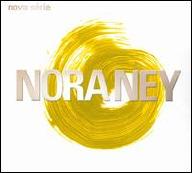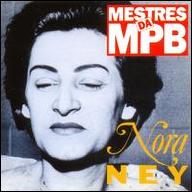Nora Ney was also the first Brazilian artist to record rock roll, in 1955 (Bill Haley and his Comets' hit Rock Around the Clock, by Max Freeman and Jimmy DeKnight). Having taught herself a little guitar when still a child, Iracema de Souza Ferreira, who later would take the stage name Nora Ney, was a regular at the auditoriums where the radio shows of the golden age were broadcast from. In that period she was already sitting in when solicited by the eventual host. After a failed marriage, she went to live with the singer Jorge Goulart, with the couple remaining together for 50 years.
Before Ney went pro, she used to frequent the Sinatra-Farney fan club in the late '40s at Dick Farney's home. Influenced by American music, she presented in those meetings the songs-turned-hits by Frank Sinatra in her low and velvety voice. Encouraged by the other musicians present there (such as Johnny Alf), she started as a professional singer in the early '50s at Rádio Tupi. In that period, her strong points were American songs like Stormy Weather and The Man I Love, taking the stage name Nora May, soon changed to Nora Ney after she had her name written like that by a fan in a letter. Invited by Almirante to replace Araci de Almeida, who was on vacation, Ney started to interpret Brazilian music, choosing Noel Rosa sambas, de Almeida's specialty. Having pleased the audiences, she was given a show of her own by producer Haroldo Barbosa, in which she interpreted only songs by Brazilian composers like Dorival Caymmi, Noel Rosa, and Ary Barroso. In the early '50s, Ney also became featured in shows at the luxury Golden Room of the Copacabana Palace Hotel. In 1952, hired by the Continental recording company, she recorded her first album, in which she launched the composer Antônio Maria with Menino Grande. The B-side had Quanto Tempo Faz (Paulo Soledade and Fernando Lobo). Menino Grande became one of her other hits. In the same year, she launched another all-time classic by Maria, the samba-canção fossa Ninguém Me Ama, for which Ney got the first gold record ever issued in Brazil, associating everlastingly her voice to the pains of love.
In 1953, Ney recorded another hit, De Cigarro em Cigarro (Luís Bonfá), being elected the "Queen of Radio." Enjoying massive popularity, Nora Ney had several other successes in the '50s, and one of the biggest of them was the classic samba Só Louco (Dorival Caymmi). In 1958, she recorded Vai Mesmo (Ataulfo Alves) and left Brazil with Jorge Goulart for an international tour through South and North America, Europe, Africa, and the Middle East. The couple was accused of being communist and was on the first list of ousted artists from the Rádio Nacional after the military coup in 1964. But their popularity survived the dark times and they went on with their individually successful careers.
In the early '70s, Ney and Goulart starred in a show at the Feitiço da Vila club in Belo Horizonte (Minas Gerais), also participating together in the show Brazilian Follies at the Hotel Nacional (Rio de Janeiro); in the Seis e Meia project at the Funarte Hall in 1979; with the show Casal Vinte and in the same room; and in the next year, in the show Roteiro de um Boêmio, about Lupicínio Rodrigues, composer of several of her hits like Aves Daninhas. In 1982, the couple commemorated 30 years together with the show De Coração a Coração at the Gonzaga theater (Rio Janeiro). In 1985, Ney performed with Jamelão in the Pixinguinha project in the cities of Curitiba (Paraná), Goiânia (Goiás), Florianópolis (Santa Catarina), and Brasília (Distrito Federal). Teaming up in 1990 with other radio old-timers Carmélia Alves, Rosita Gonzalez, Ellen de Lima, Violeta Cavalcanti, and Zezé Gonzaga, Ney performed in the show As Eternas Cantoras do Rádio, recording with them a similarly titled CD in 1993. ~ Alvaro Neder, Rovi














